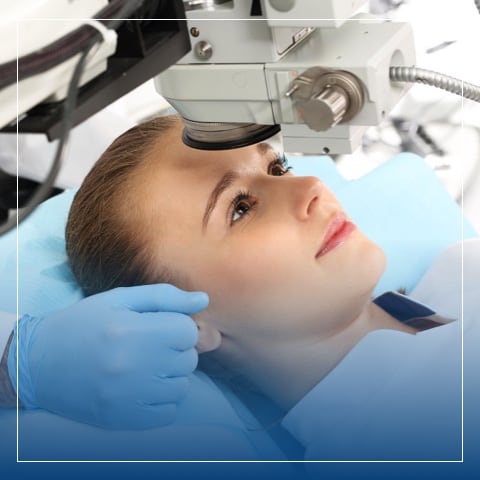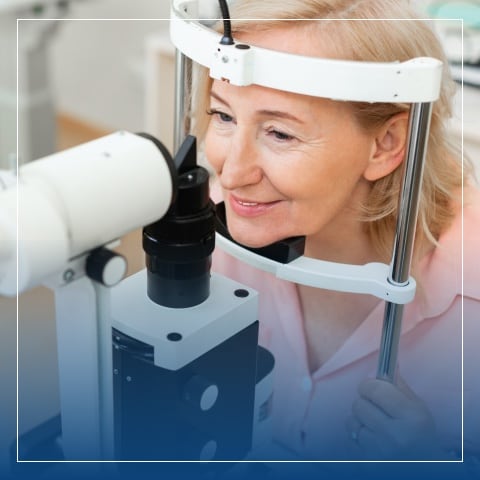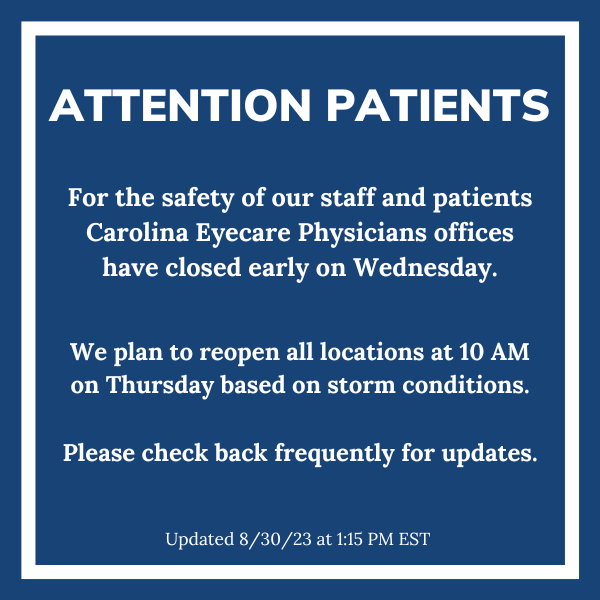

We Can Help Protect Your Vision
Glaucoma requires early treatment to prevent further vision loss. At Carolina Eyecare Physicians, our knowledgeable team can identify and treat glaucoma with advanced technologies, including medication, surgery, and other treatments.
Many types of glaucoma exist, but our team can offer you the care you need. Visit one of our locations for exceptional eye care and glaucoma treatment.

What Is Glaucoma?
Glaucoma is a group of diseases that occurs when there is increased fluid pressure within the eye. If left untreated, this pressure can cause irreversible damage to the optic nerve. Glaucoma is one of the leading causes of blindness today.
The Different Types of Glaucoma
The two most frequently occurring types are primary open-angle glaucoma and angle-closure glaucoma.
With primary open-angle glaucoma, the eye’s drainage canals are open but they have become less efficient in draining fluid. Fluid build-up causes the pressure to build up slowly over time, so you may not be aware of the problem until your optic nerve is already damaged. At first, vision remains normal. As the pressure continues to damage the optic nerve, patients may notice a loss or blurring of their side vision. If left untreated, the field of vision continues to narrow more and more, leading to eventual blindness.
In angle-closure glaucoma, the iris (the part of the eye that creates eye color) blocks the entrance to the drainage canal, sometimes causing the pressure within the eye to build up suddenly. Symptoms of an acute angle-closure glaucoma attack include severe eye pain, red eye, blurred vision, headache, nausea, and vomiting. This is a true emergency that can lead to blindness if not treated promptly. More commonly, however, the iris blocks the entrance to the drainage canal more slowly and causes chronic angle-closure glaucoma. Cataract formation, too, can sometimes lead to angle closure. Thorough glaucoma eye exams can detect narrow angles that are at risk of closure. Laser treatment to the iris can usually prevent angle-closure glaucoma.
What are the symptoms
Glaucoma often goes unnoticed in its early stages because it usually does not cause pain or immediate changes in vision. If you have glaucoma, you probably won’t notice any warning signs or symptoms until your vision has suffered irreversible damage. That’s why it is crucial to identify glaucoma symptoms and treatment before your situation worsens.
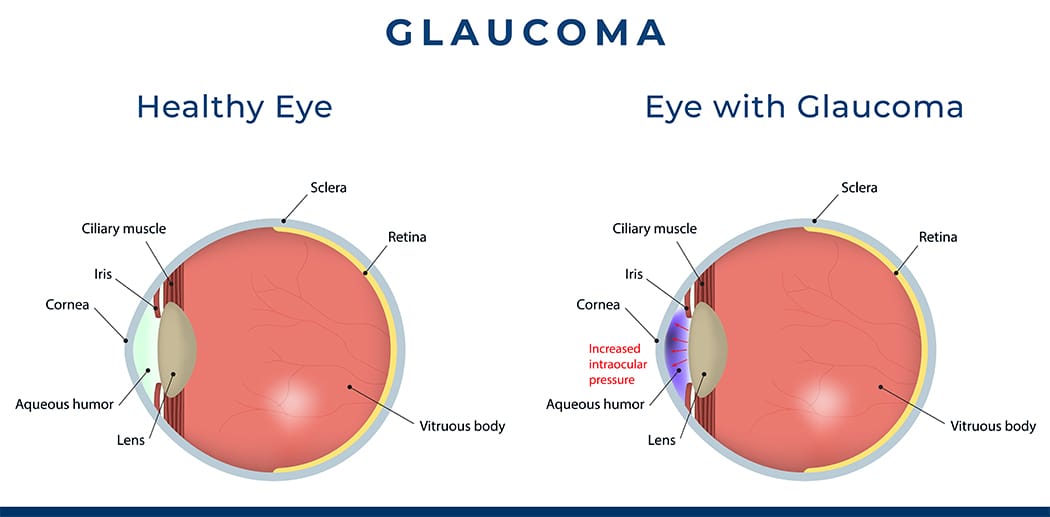
Am I at Risk
Glaucoma typically affects people over the age of 40, but it can occur at any age. Everyone is at risk for glaucoma, but some groups are at higher risk than others. People age 65 or older, family members of those already diagnosed with glaucoma, African-Americans, Asian-Americans, diabetics, and those who are nearsighted or who have suffered severe injury to the eye are all at elevated risk. Cataract formation is another risk factor.
Again, early detection is the key to slowing or halting the progression of this disease. If you have any of these risk factors, we recommend that you schedule a thorough eye examination to evaluate for glaucoma.
How is Glaucoma Diagnosed
Because early detection is so important to limit the vision loss associated with glaucoma, regular eye examinations are recommended. Elevated pressure within the eye and other indicators of glaucoma, such as optic nerve damage, can be detected only by a thorough examination. At Carolina Eyecare Physicians, we offer advanced state-of-the-art computerized evaluation techniques to detect early signs of optic nerve damage and peripheral vision loss associated with glaucoma.
Can Glaucoma be Prevented
No, but regular eye exams can make it possible to prevent much of the vision loss caused by glaucoma. The doctors of Carolina Eyecare Physicians are dedicated to providing the most advanced techniques, equipment, and expertise to help preserve the vision you need to live life on your own terms.
What are the Symptoms of Glaucoma?
Glaucoma often goes unnoticed in its early stages because it usually does not cause pain or immediate changes in vision. If you have glaucoma, you probably won’t notice any warning signs or symptoms until your vision has suffered irreversible damage. That’s why it is crucial to identify glaucoma symptoms and treatment before your situation worsens.

Am I at Risk for Glaucoma?
Glaucoma typically affects people over the age of 40, but it can occur at any age.
While anyone can develop glaucoma, some people have a higher risk. These factors include:
- Age
- Certain medical conditions
- Family history
- Previous eye injury
- Extreme nearsightedness or farsightedness
How is Glaucoma Diagnosed?
Because early detection is so important to limit the vision loss associated with glaucoma, regular eye examinations are recommended. Elevated pressure within the eye and other indicators of glaucoma, such as optic nerve damage, can only be detected by a thorough examination.
At Carolina Eyecare Physicians, we offer advanced state-of-the-art computerized evaluation techniques to detect early signs of optic nerve damage and peripheral vision loss associated with glaucoma.

Can Glaucoma be Prevented?
Glaucoma can’t be prevented but regular eye exams can make it possible to prevent much of the vision loss caused by glaucoma. The doctors of Carolina Eyecare Physicians are dedicated to providing the most advanced techniques, equipment, and expertise to help preserve the vision you need to live life on your own terms.
Treating Glaucoma
Carolina Eyecare Physicians is a leader in bringing the latest technologies to our patients. We can offer specialized glaucoma treatment for your unique needs and recommend the most effective options to control eye pressure and prevent vision loss.
Our available treatments include:
- Medication: A variety of eye drops and oral medications exist to control glaucoma—your doctor can recommend different medications based on your needs
- Selective laser trabeculoplasty (SLT): SLT uses short energy pulses to reduce intraocular pressure for patients with open-angle glaucoma
- Minimally-invasive glaucoma surgery: Minimally-invasive glaucoma surgery involves placing a stent to help bypass normal fluid drainage, lowering eye pressure
- Trabeculectomy: Trabeculectomy is a type of glaucoma surgery used to create a new pathway for fluid to drain inside of the eye
- Tube implants: Tube implants are silicone tubes implanted into the eye to assist in fluid drainage to keep eye pressure down

Detect Glaucoma Before It Worsens
Without treatment, glaucoma can lead to severe vision loss and blindness. With an early diagnosis, our team at Carolina Eyecare Physicians can help preserve and protect your vision.
Contact us for an eye exam so we can detect glaucoma before it worsens.
Locations
We have several convenient locations throughout South Carolina. Please view the nearest location to you or get directions below.
Our Services

See Our Google Reviews

News
Natural Remedies for Dry Eye Relief: What Works?
Dry EyeDry eye syndrome can leave your eyes feeling uncomfortable, appearing red, or as though sand is trapped within them, often resulting in a burning or stinging sensation. This condition arises when the small glands around your eyelids fail to produce enough tears, which is vital for keeping your eyes moist, clear, and healthy. Are you […]
Read More… from Natural Remedies for Dry Eye Relief: What Works?
Eye Safety Tips for the Solar Eclipse
News & UpdatesHello eclipse enthusiasts! With the much-anticipated solar eclipse just around the corner, the team at Carolina Eyecare Physicians wants to make sure you’re all set to enjoy this celestial marvel safely. As your trusted eye care providers here in Charleston, South Carolina, we’re sharing some friendly reminders to help protect your vision during the big […]
5 Unexpected Benefits of LASIK Treatment You Might Not Know About
LASIK, LASIK SurgeryFor many, getting LASIK surgery is motivated by the simple desire to ditch their glasses or contact lenses for good. However, what often goes unnoticed are the subtle yet profound benefits of this modern corrective eye procedure. Beyond the obvious allure of improved vision, LASIK vision correction treatment offers advantages that can greatly enhance your […]
Read More… from 5 Unexpected Benefits of LASIK Treatment You Might Not Know About
Natural Remedies for Dry Eye Relief: What Works?

Dry eye syndrome can leave your eyes feeling uncomfortable, appearing red, or as though sand is trapped within them, often resulting in a burning or stinging sensation. This condition arises when the small glands around your eyelids fail to produce enough tears, which is vital for keeping your eyes moist, clear, and healthy. Are you […]
Read More… from Natural Remedies for Dry Eye Relief: What Works?
Eye Safety Tips for the Solar Eclipse
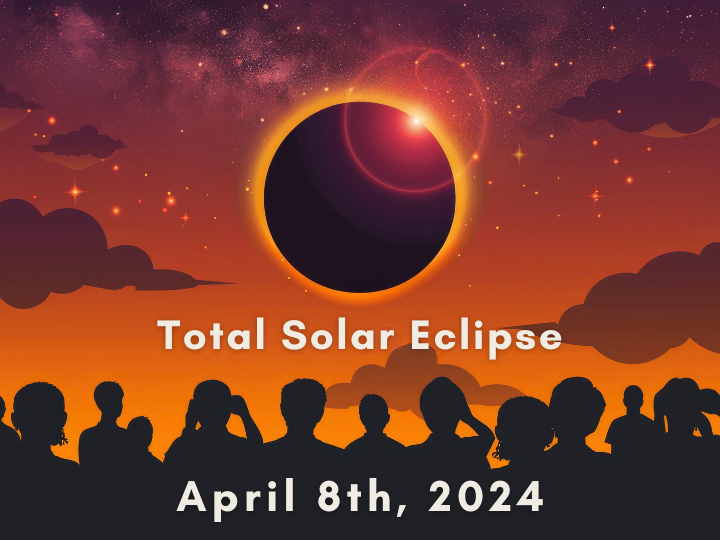
Hello eclipse enthusiasts! With the much-anticipated solar eclipse just around the corner, the team at Carolina Eyecare Physicians wants to make sure you’re all set to enjoy this celestial marvel safely. As your trusted eye care providers here in Charleston, South Carolina, we’re sharing some friendly reminders to help protect your vision during the big […]
5 Unexpected Benefits of LASIK Treatment You Might Not Know About
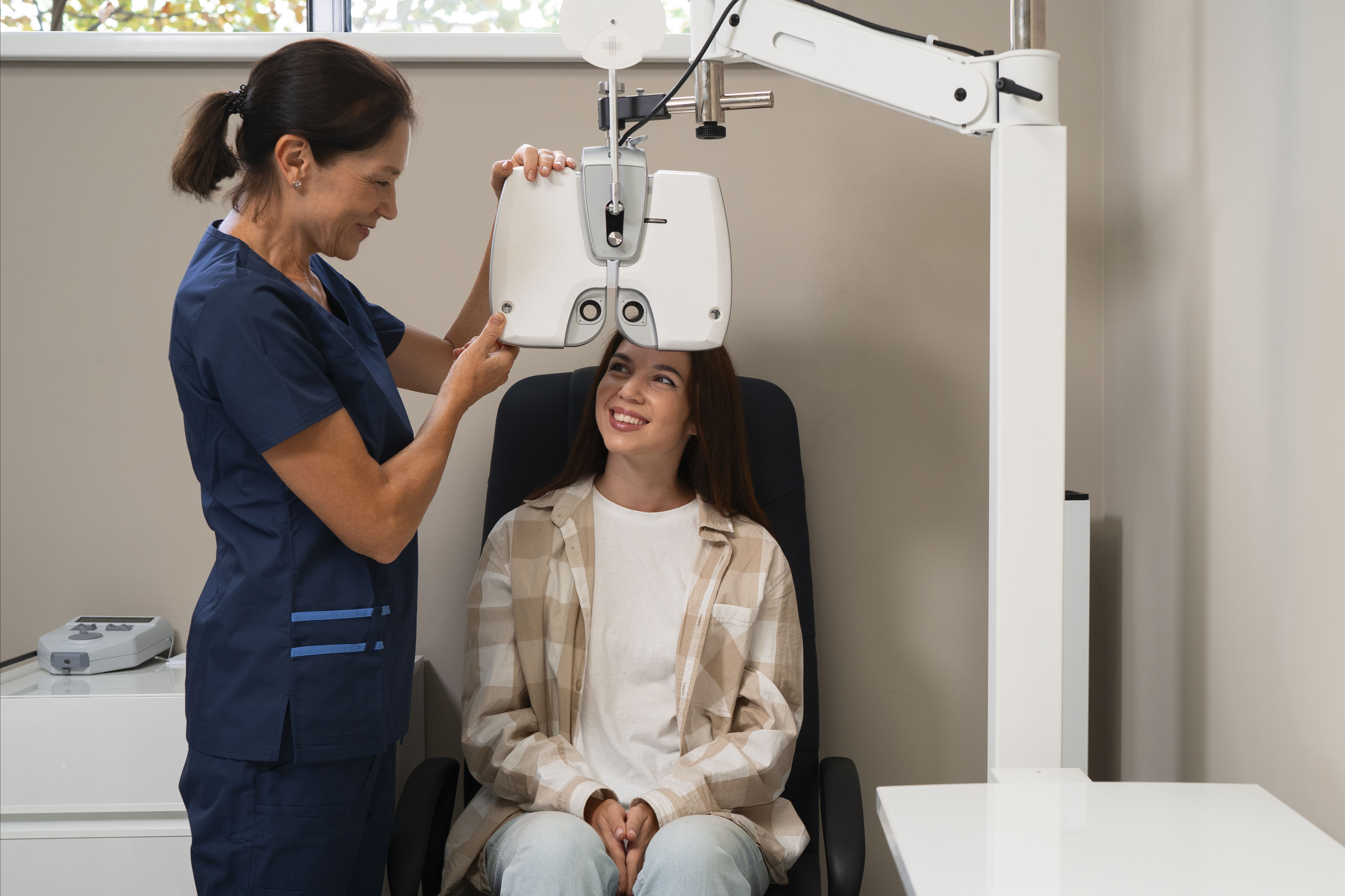
For many, getting LASIK surgery is motivated by the simple desire to ditch their glasses or contact lenses for good. However, what often goes unnoticed are the subtle yet profound benefits of this modern corrective eye procedure. Beyond the obvious allure of improved vision, LASIK vision correction treatment offers advantages that can greatly enhance your […]
Read More… from 5 Unexpected Benefits of LASIK Treatment You Might Not Know About
Check us out on Instagram
Check us out on Instagram


We are a proud partner of US Eye, a leading group of patient-centric, vertically integrated multi-specialty physician practices providing patients with care in ophthalmology, optometry, dermatology, audiology, and cosmetic facial surgery.



